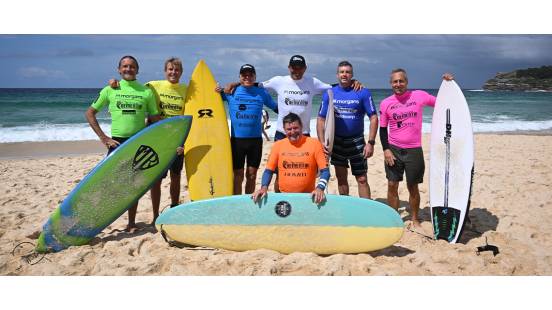Pro Surfers Join Property Executives in Wipeout Dementia

Surfing legends Owen Wright and Mark 'Occy' Occhilupo are teaming up with property industry executives to tackle the escalating dementia challenge.
The Australian pro surfers will be hitting Sydney's iconic Bondi Beach on 5 April 2024 to surf Wipeout Dementia and help advance research led by UNSW's Centre for Healthy Brain Ageing (CHeBA).
2020 Olympic bronze medalist Owen Wright witnessed the start of his father's decline to dementia not long after Wright suffered a traumatic brain injury from a heavy wipeout while competing for a world title at Pipeline.
"Dad was there for me when I needed him most throughout my recovery and life," says Wright, who recently retired from professional surfing.
"His decline has been a really hard thing to watch, but it's been an honour to care for my father now I have the time and I somewhat feel like I understand a little about what he's experiencing after my own battle with my brain."
The professional surfers will join long-term Wipeout Dementia Ambassador and 1978 World Surfing Champion Wayne 'Rabbit' Bartholomew AM to drive key messaging around the need for physical activity throughout life, to reduce risk of dementia in late life.
"It's an honour to be an Ambassador for this worthy cause and in some small way help promote healthy brain ageing in this country," said 1999 World Title winner Occy.
This will be the 13th Wipeout Dementia event, with 56 surfers across the property industry riding the social impact wave to advance large-scale research into prevention of dementia and increase awareness about how to modify lifestyle behaviours to ward off cognitive decline. Seven teams will surf off against each other sponsored by Morgans Financial, Avenor, Winten Property Group, Buildcorp, AWM, SHAPE, Sense Projects, Haigs, SBC Plumbing and NetNada.
Since the first event in 2015 the number of people living with a dementia diagnosis has risen from 44 million to approximately 57 million. The number of Australians living with dementia has increased to more than 487,000, and during that time it has become the leading cause of death in women – surpassing heart disease which had been the leading cause of death since the 20th century.
Over that time many of the surfers have lost a loved one to dementia or have had a family member diagnosed with the disease, including Steve Watson whose father – a life-long surfer – passed away from dementia in 2019.
"I lost my Dad to Lewy body dementia in 2019 and it was devastating to watch him being robbed of his vitality.
"This disease is pervasive and more needs to be done given how debilitating it is," said Watson.
CHeBA Co-Directors Professor Henry Brodaty and Professor Perminder Sachdev say that the evidence is clear that the brain abnormalities that lead to Alzheimer's disease, the commonest form of dementia, start 20-30 years before any symptoms become apparent, indicating that our behaviours in young and mid adulthood have a significant impact on our brain health in old age.
To make a more precise diagnosis of dementia and to diagnose early before symptoms become evident, we need to develop clear biomarkers.
"While this has progressed rapidly in Alzheimer's disease in recent years, Vascular Dementia lags considerably," says Professor Sachdev.
Vascular cognitive disorders represent a major health care burden on society, with Vascular dementia the second most common form of dementia, after Alzheimer's disease.
It is characterised as "preventable" dementia, and the data from studies and intervention trials so far indicate this may be the basis for the changing epidemiology of dementia.
CHeBA has a special focus on Vascular Dementia, especially that due to cerebral small vessel disease, and is ramping up its research focus on the development of biomarkers for this disorder.
The Centre focuses on four types of biomarkers: blood biomarkers, neuroimaging, digital biomarkers and retinal imaging.
Use of these biomarkers will help facilitate earlier detection of small vessel disease, as well as mild cognitive impairment due to other causes, so that treatments can be developed to stop progression to cognitive impairment and dementia.
Without a medical breakthrough, the number of people living with dementia globally is expected to triple by 2056.
"The sharing of personal stories continues to inspire us to expand our research across the full spectrum of the disease beyond drug treatments, to include early diagnosis and prevention strategies," say Professors Brodaty and Sachdev, who are both clinicians as well as researchers.
To sponsor a surfer: wipeout-dementia-2024.raisely.com
Wipeout Dementia: Steve Watson of Steve Watson & Partners, Peter Clemesha of Avenor, Craig Rodgers of TSA Advisory, Anthony Scotts of AWM, Darren Beasley of Novm, Michael Gordon of Buildcorp and Philip Vivian of Bates Smart. Credit: Sprout Daily
MORE



